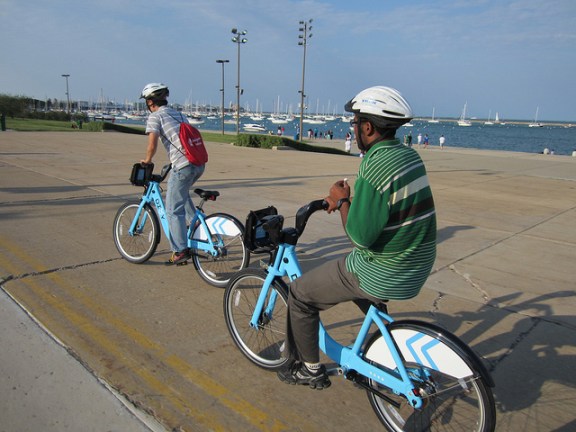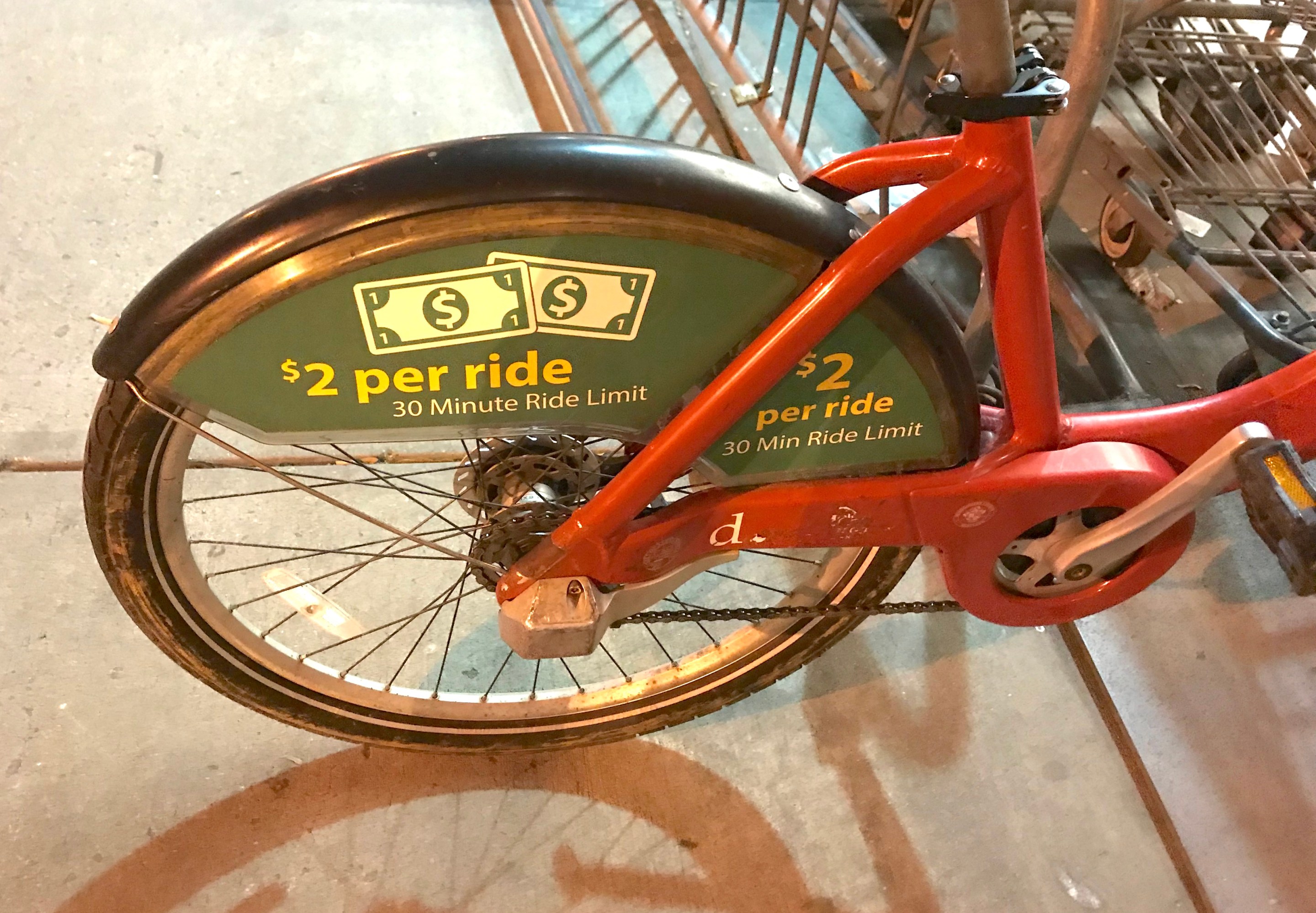Practically ever since the Divvy bike-share system debuted in summer 2013, Chicago cyclists have been asking for the option to buy a single ride. They've also requesting that the 30-minute time limit for holding onto a bike be extended, so that they don't constant have to watch the clock to avoid late fees.
Four-and-a-half years later, they're finally getting what they asked for. Divvy announced this morning that it will be offering $3 single-ride fares and extending the time limit for members to 45 minutes. They're also raising the price of the $9.95 day pass to $15, including the option to take leisurely rides of up to three hours -- as many as you want within a 24-hour period -- and rebranding it the "Explorer Pass." Starting on February the single ride and Explorer Pass options will be available for purchase on the Transit app.
“Divvy has been a tremendous success story in Chicago, but we believe that our customers will embrace more pricing options that are tailored to their needs,” said Chicago Department of Transportation commissioner Rebekah Scheinfeld. “These new more flexible choices will provide benefits to all Divvy users, and we hope encourage some casual riders to join Divvy as annual members.”
The single-ride option, which is already common in other bike-share cities, is a good opportunity for Chicagoans to try out the system before committing to a $99 standard annual membership. (one-time $5 Divvy for Everyone annual memberships are available to residents who make less than $35,310 a year.) It also offers a way to use Divvy as an occasional "first/last mile" option to and from transit stations for people who don't think they would do so more than 30 times a year. Single-ride users will be limited to 30-minute trips.
Notably, the $3 charge is more expensive that a $2.25 CTA bus trip or $2.50 'L' train ride. While it's the same price as single rides in cities like Milwaukee, Minneapolis, and San Francisco, it's also costlier than the $2 single-ride option available in cities like Washington, D.C., and much more expensive that the typical $1 charge for a 30-minute dockless bike-share trip. The cheaper cost for ride in the District is related to the recent need for an alternative to that city's Metro system while extensive repairs were taking place. The low cost of a DoBi ride is partly due to the dockless companies being subsidized by venture capital.

Changing the current $9.95 day pass to the $15 Explorer Pass seems like a good way to make the system more useful for visitors while potentially increasing revenue. A relaxed spin on the Lakefront Trail should be on the to-do list for anyone visiting our city who like to ride a bike, but it's currently not convenient to do so via Divvy, because you either have to re-dock your bike every half hour or else accrue late charges. With the new type of day pass, tourists can take a carefree ride for up to three hours without constantly checking the time and scrambling to find a station to refresh their cycle. Visitors who simply want to take a handful of short rides can use the single-ride option.
The one downside of this new policy is that it may hurt local bike rental companies, since it eliminates a main advantage they had over bike-share. On the other hand, unlike Divvy, those companies offer rentals for people under 16, helmets, maps, tours, and other services, so hopefully the change won't drive anyone out of business.
Divvy spokeswoman Kelly Goldthorpe says the Explorer Pass is a first among major U.S. cities. "The pass was inspired by the way we see visitors use the system most - with long rides along the lake front and around town. We're excited to offer products that really match the way our riders want to use the system most."
The extension of the 30-minute time limit to 45 minutes for members will also make the system easier to use. Currently when I take a trip on Divvy from that will be longer than a half hour, I stop and re-dock the bike along the way, but it will be nice not to have to worry about that for trips less than 45 minutes. This new policy will be especially useful for residents on the South and West sides, where lower population density and issues with food and retail deserts means that destinations tend to be farther away than on the North Side.

Divvy is also simplifying the late charge structure to a flat fee of $3, which is more expensive than the current $1.50 for the second half hour for members, $2 for Day Pass Holders. But this fee structure is much easier to understand than the current rates, which get larger the longer you hold onto a bike, and the new fee is cheaper if you're keeping onto a bike for multiple half hours.
In fact, visitors who wants to use a bike for a single extended ride but aren't sure they'll hold onto it for a full three hours might opt to buy a single ride and then rack up as many $3 late fees as needed. If they keep the bike for two-and-a-half hours this way, it will still only cost $15, while the the Explorer Pass would only save them $3 for a single three-hour ride.
It's great to see Divvy responding to users' requests for more flexible options. The next obvious move for the system is to look into retrofitting bikes with wheel locks so that they can also be used as dockless cycles. This which would help the network to stay competitive in the event that the city lets DoBi providers set up shop here. While this would require a strategy to prevent dockless Divvies from obstructing sidewalks, it would also create a new travel option for residents whose neighborhoods don't yet have docks.




